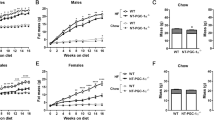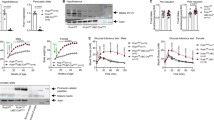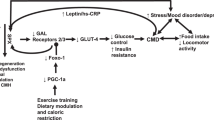Abstract
Background:
Proprotein convertase subtilisin/xexin type 2 (PCSK2) is an endoproteinase responsible for proteolytic activation of a number of precursors to active neuropeptides and peptide hormones, known to influence glucose homeostasis, food intake and ultimately body mass. In this study, we examined the consequences of PCSK2 deficiency on these phenotypic traits.
Study Design:
Weight gain with age under diets of different fat contents was monitored. White adipose tissue (WAT) and muscle masses were evaluated. Plasma levels of triglycerides, leptin, ghrelin, insulin and proglucagon-derived peptides were measured as well as leptin and acetyl coenzyme-α carboxylase (ACCα) mRNA levels in adipose tissue.
Results:
Compared with their Pcsk2+/+ littermates, Pcsk2−/− mice weighed significantly less as weanlings and as adults. As adults, they carried noticeably less fat mass, with similar lean muscle mass: their plasma leptin level and adipose tissue leptin mRNA level were accordingly lower. PCSK2 deficiency did not affect food intake or the level of the orexigenic hormone ghrelin. However, PCSK2 deficiency resulted in decreased plasma triglycerides and reduced ACCα mRNA levels in WAT. Interestingly, unlike their Pcsk2+/+ littermates, Pcsk2−/− were resistant to enhanced body weight gain when fed a high-fat diet. Consistent with a role of PCSK2 in body mass gain, diet-induced or genetically obese mice were found to contain significantly higher levels of PCSK2 mRNA in their brain and stomach than their lean counterparts.
Conclusion:
Collectively, these results suggest that PCSK2 contributes to increase in body mass through the various regulatory peptides generated through its action. It represents a potential target in the prevention and treatment of obesity.
This is a preview of subscription content, access via your institution
Access options
Subscribe to this journal
Receive 12 print issues and online access
$259.00 per year
only $21.58 per issue
Buy this article
- Purchase on Springer Link
- Instant access to full article PDF
Prices may be subject to local taxes which are calculated during checkout






Similar content being viewed by others
References
Seidah NG, Chretien M . Proprotein and prohormone convertases: a family of subtilases generating diverse bioactive polypeptides. Brain Res 1999; 848: 45–62.
Steiner DF . The proprotein convertases. Curr Opin Chem Biol 1998; 2: 31–39.
Furuta M, Yano H, Zhou A, Rouillé Y, Holst JJ, Carroll R et al. Defective prohormone processing and altered pancreatic islet morphology in mice lacking active SPC2. Proc Natl Acad Sci USA 1997; 94: 6646–6651.
Furuta M, Carroll R, Martin S, Swift HH, Ravazzola M, Orci L et al. Incomplete processing of proinsulin to insulin accompanied by elevation of Des-31,32 proinsulin intermediates in islets of mice lacking active PC2. J Biol Chem 1998; 273: 3431–3437.
Ni XP, Pearce D, Butler AA, Cone RD, Humphreys MH . Genetic disruption of gamma-melanocyte-stimulating hormone signaling leads to salt-sensitive hypertension in the mouse. J Clin Invest 2003; 111: 1251–1258.
Croissandeau G, Wahnon F, Yashpal K, Seidah NG, Coderre TJ, Chretien M et al. Increased stress-induced analgesia in mice lacking the proneuropeptide convertase PC2. Neurosci Lett 2006; 406: 71–75.
Wang J, Xu J, Finnerty J, Furuta M, Steiner DF, Verchere CB . The prohormone convertase enzyme 2 (PC2) is essential for processing pro-islet amyloid polypeptide at the NH2-terminal cleavage site. Diabetes 2001; 50: 534–539.
Marzban L, Rhodes CJ, Steiner DF, Haataja L, Halban PA, Verchere CB . Impaired NH2-terminal processing of human proislet amyloid polypeptide by the prohormone convertase PC2 leads to amyloid formation and cell death. Diabetes 2006; 55: 2192–2201.
Miller R, Toneff T, Vishnuvardhan D, Beinfeld M, Hook VY . Selective roles for the PC2 processing enzyme in the regulation of peptide neurotransmitter levels in brain and peripheral neuroendocrine tissues of PC2 deficient mice. Neuropeptides 2003; 37: 140–148.
Miller R, Aaron W, Toneff T, Vishnuvardhan D, Beinfeld MC, Hook VY . Obliteration of alpha-melanocyte-stimulating hormone derived from POMC in pituitary and brains of PC2-deficient mice. J Neurochem 2003; 86: 556–563.
Pan H, Che FY, Peng B, Steiner DF, Pintar JE, Fricker LD . The role of prohormone convertase-2 in hypothalamic neuropeptide processing: a quantitative neuropeptidomic study. J Neurochem 2006; 98: 1763–1777.
Rehfeld JF, Lindberg I, Friis-Hansen L . Increased synthesis but decreased processing of neuronal proCCK in prohormone convertase 2 and 7B2 knockout animals. J Neurochem 2002; 83: 1329–1337.
Berman Y, Mzhavia N, Polonskaia A, Furuta M, Steiner DF, Pintar JE et al. Defective prodynorphin processing in mice lacking prohormone convertase PC2. J Neurochem 2000; 75: 1763–1770.
Villeneuve P, Feliciangeli S, Croissandeau G, Seidah NG, Mbikay M, Kitabgi P et al. Altered processing of the neurotensin/neuromedin N precursor in PC2 knock down mice: a biochemical and immunohistochemical study. J Neurochem 2002; 82: 783–793.
Johanning K, Juliano MA, Juliano L, Lazure C, Lamango NS, Steiner DF et al. Specificity of prohormone convertase 2 on proenkephalin and proenkephalin-related substrates. J Biol Chem 1998; 273: 22672–22680.
Allen RG, Peng B, Pellegrino MJ, Miller ED, Grandy DK, Lundblad JR et al. Altered processing of pro-orphanin FQ/nociceptin and pro-opiomelanocortin-derived peptides in the brains of mice expressing defective prohormone convertase 2. J Neurosci 2001; 21: 5864–5870.
Beck B . Neuropeptides and obesity. Nutrition 2000; 16: 916–923.
Chiu S, Kim K, Haus KA, Espinal GM, Millon LV, Warden CH . Identification of positional candidate genes for body weight and adiposity in subcongenic mice. Physiol Genomics 2007; 31: 75–85.
Farber CR, Chitwood J, Lee SN, Verdugo RA, Islas-Trejo A, Rincon G et al. Overexpression of Scg5 increases enzymatic activity of PCSK2 and is inversely correlated with body weight in congenic mice. BMC Genet 2008; 9: 34.
Mbikay M, Croissandeau G, Sirois F, Anini Y, Mayne J, Seidah NG et al. A targeted deletion/insertion in the mouse Pcsk1 locus is associated with homozygous embryo preimplantation lethality, mutant allele preferential transmission and heterozygous female susceptibility to dietary fat. Dev Biol 2007; 306: 584–598.
Furuta M, Zhou A, Webb G, Carroll R, Ravazzola M, Orci L et al. Severe defect in proglucagon processing in islet A-cells of prohormone convertase 2 null mice. J Biol Chem 2001; 276: 27197–27202.
Webb GC, Dey A, Wang J, Stein J, Milewski M, Steiner DF . Altered proglucagon processing in an alpha-cell line derived from prohormone convertase 2 null mouse islets. J Biol Chem 2004; 279: 31068–31075.
Schafer MK, Day R, Cullinan WE, Chretien M, Seidah NG, Watson SJ . Gene expression of prohormone and proprotein convertases in the rat CNS: a comparative in situ hybridization analysis. J Neurosci 1993; 13: 1258–1279.
Winsky-Sommerer R, Benjannet S, Rovere C, Barbero P, Seidah NG, Epelbaum J et al. Regional and cellular localization of the neuroendocrine prohormone convertases PC1 and PC2 in the rat central nervous system. J Comp Neurol 2000; 424: 439–460.
Marcinkiewicz M, Ramla D, Seidah NG, Chretien M . Developmental expression of the prohormone convertases PC1 and PC2 in mouse pancreatic islets. Endocrinology 1994; 135: 1651–1660.
Tanaka S, Kurabuchi S, Mochida H, Kato T, Takahashi S, Watanabe T et al. Immunocytochemical localization of prohormone convertases PC1/PC3 and PC2 in rat pancreatic islets. Arch Histol Cytol 1996; 59: 261–271.
Gagnon J, Mayne J, Mbikay M, Woulfe J, Chretien M . Expression of PCSK1 (PC1/3), PCSK2 (PC2) and PCSK3 (furin) in mouse small intestine. Regul Pept 2009; 152: 54–60.
Hardiman A, Friedman TC, Grunwald Jr WC, Furuta M, Zhu Z, Steiner DF et al. Endocrinomic profile of neurointermediate lobe pituitary prohormone processing in PC1/3- and PC2-Null mice using SELDI-TOF mass spectrometry. J Mol Endocrinol 2005; 34: 739–751.
Zhu X, Cao Y, Voogd K, Steiner DF . On the processing of proghrelin to ghrelin. J Biol Chem 2006; 281: 38867–38870.
Friedman JM . Leptin at 14 y of age: an ongoing story. Am J Clin Nutr 2009; 89: 973S–979S.
Russell CD, Petersen RN, Rao SP, Ricci MR, Prasad A, Zhang Y et al. Leptin expression in adipose tissue from obese humans: depot-specific regulation by insulin and dexamethasone. Am J Physiol 1998; 275: E507–E515.
Mueller WM, Gregoire FM, Stanhope KL, Mobbs CV, Mizuno TM, Warden CH et al. Evidence that glucose metabolism regulates leptin secretion from cultured rat adipocytes. Endocrinology 1998; 139: 551–558.
Attoub S, Levasseur S, Buyse M, Goiot H, Laigneau JP, Moizo L et al. Physiological role of cholecystokinin B/gastrin receptor in leptin secretion. Endocrinology 1999; 140: 4406–4410.
Rehfeld JF, Bundgaard JR, Hannibal J, Zhu X, Norrbom C, Steiner DF et al. The cell-specific pattern of cholecystokinin peptides in endocrine cells versus neurons is governed by the expression of prohormone convertases 1/3, 2, and 5/6. Endocrinology 2008; 149: 1600–1608.
Doyle ME, Egan JM . Mechanisms of action of glucagon-like peptide 1 in the pancreas. Pharmacol Ther 2007; 113: 546–593.
Anini Y, Brubaker PL . Role of leptin in the regulation of glucagon-like peptide-1 secretion. Diabetes 2003; 52: 252–259.
Furuta M, Zhou A, Webb G, Carroll R, Ravazzola M, Orci L et al. Severe defect in proglucagon processing in islet A-cells of prohormone convertase 2 null mice. J Biol Chem 2001; 276: 27197–27202.
Webb GC, Dey A, Wang J, Stein J, Milewski M, Steiner DF . Altered proglucagon processing in an alpha-cell line derived from prohormone convertase 2 null mouse islets. J Biol Chem 2004; 279: 31068–31075.
Conarello SL, Jiang G, Mu J, Li Z, Woods J, Zycband E et al. Glucagon receptor knockout mice are resistant to diet-induced obesity and streptozotocin-mediated beta cell loss and hyperglycaemia. Diabetologia 2007; 50: 142–150.
Peinado JR, Laurent V, Lee SN, Peng BW, Pintar JE, Steiner DF et al. Strain-dependent influences on the hypothalamo-pituitary-adrenal axis profoundly affect the 7B2 and PC2 null phenotypes. Endocrinology 2005; 146: 3438–3444.
Jackson RS, Creemers JW, Farooqi IS, Raffin_Sanson ML, Varro A, Dockray GJ et al. Small-intestinal dysfunction accompanies the complex endocrinopathy of human proprotein convertase 1 deficiency. J Clin Invest 2003; 112: 1550–1560.
Lloyd DJ, Bohan S, Gekakis N . Obesity, hyperphagia and increased metabolic efficiency in PC1 mutant mice. Hum Mol Genet 2006; 15: 1884–1893.
Farooqi IS, Volders K, Stanhope R, Heuschkel R, White A, Lank E et al. Hyperphagia and early-onset obesity due to a novel homozygous missense mutation in prohormone convertase 1/3. J Clin Endocrinol Metab 2007; 92: 3369–3373.
Benzinou M, Creemers JW, Choquet H, Lobbens S, Dina C, Durand E et al. Common nonsynonymous variants in PCSK1 confer risk of obesity. Nat Genet 2008; 40: 943–945.
Laurent V, Jaubert-Miazza L, Desjardins R, Day R, Lindberg I . Biosynthesis of proopiomelanocortin-derived peptides in prohormone convertase 2 and 7B2 null mice. Endocrinology 2004; 145: 519–528.
Acknowledgements
We thank Dr Donald F Steiner for permission to use the Pcsk2 knockout mouse generated in his laboratory and Dr Robert Day for providing the CD1-N4 congenic strain that he derived from it. We also thank Mrs Adriana Gambarotta for maintaining the mouse colony. This work was supported by grants from the Canadian Institutes of Health Research and the Strauss Foundation. J Gagnon was supported by a Doctoral Scholarship from the Natural Sciences and Engineering Research Council of Canada (NSERC) and by the Dalhousie University President Award.
Author information
Authors and Affiliations
Corresponding author
Ethics declarations
Competing interests
The authors declare no conflict of interest.
Rights and permissions
About this article
Cite this article
Anini, Y., Mayne, J., Gagnon, J. et al. Genetic deficiency for proprotein convertase subtilisin/kexin type 2 in mice is associated with decreased adiposity and protection from dietary fat-induced body weight gain. Int J Obes 34, 1599–1607 (2010). https://doi.org/10.1038/ijo.2010.90
Received:
Revised:
Accepted:
Published:
Issue Date:
DOI: https://doi.org/10.1038/ijo.2010.90
Keywords
This article is cited by
-
Prohormone convertase 1/3 deficiency causes obesity due to impaired proinsulin processing
Nature Communications (2022)
-
Effect of a common variant of the PCSK2 gene on reduced insulin secretion
Diabetologia (2012)



